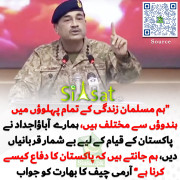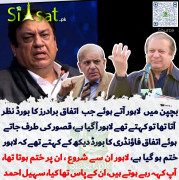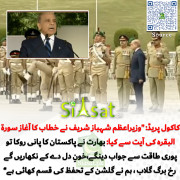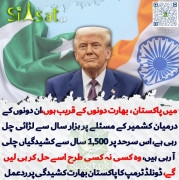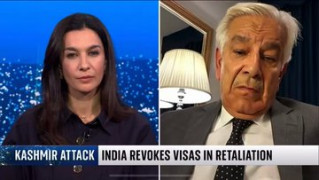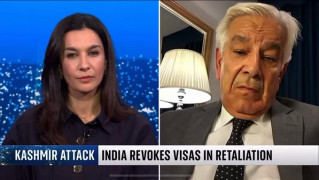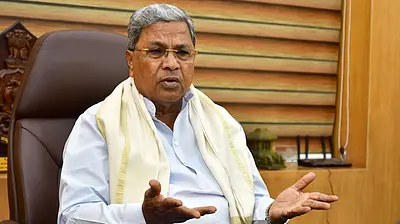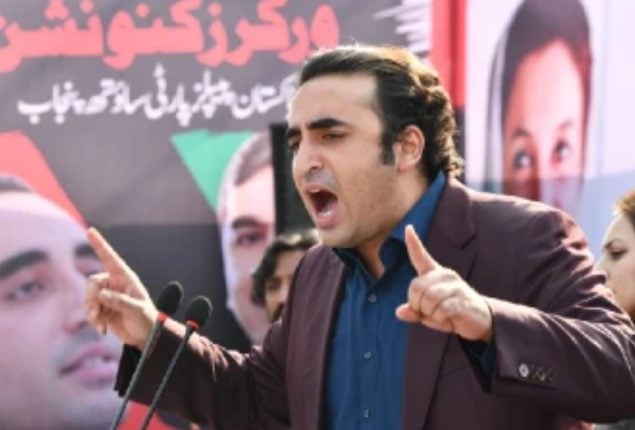Wake up Pak
(50k+ posts) بابائے فورم
March 22, 2025
A recent development has brought this undercurrent into sharper focus. Last week, a delegation from Pakistan visited Israel, an event orchestrated by Sharaka, an NGO allegedly linked to Mossad funding. Sharaka was contacted by the scribe, and offered a responce on the said allegation of funding, but they failed to respond. Upon free source investigation upon the NGO, one find that: Sharaka, meaning "partnership" in Arabic, emerged after the 2020 Abraham Accords, which normalized relations between Israel and several Arab states. The organization seeks to build people-to-people connections between Israel and countries in the Middle East and South Asia, including those without formal diplomatic relations. Its mission is ambitious: to foster dialogue, understanding, and peace through initiatives like educational programs and delegation visits.
In March 2025, Sharaka facilitated a groundbreaking trip, bringing a 10-member delegation of Pakistani journalists and educators to Israel—the largest such group to date. This visit is remarkable not only for its scale but also for its context: Pakistan maintains no diplomatic ties with Israel and enforces a longstanding travel ban to the country. To protect the participants from potential legal fallout, their passports went unstamped upon entry—a logistical workaround underscoring the sensitivity of the mission.
The delegation’s itinerary was packed with symbolic stops: Yad Vashem, Israel’s Holocaust memorial; the Knesset, the country’s parliament; and the Al-Aqsa Mosque in Jerusalem. For many, the experience challenged long-held assumptions. A journalist from Pakistan described being stunned by the freedom to pray at Al-Aqsa, a reality at odds with narratives prevalent in Pakistan. An editor in the group pledged to share his revelations with his audience.
Sharaka’s leadership, including co-chairs Dan Feferman and Amit Deri, sees this visit as a stepping stone in a broader effort to connect Israel with the Muslim world. They remain optimistic about the long-term prospects for normalization between Israel and Pakistan, potentially within the next 10 to 20 years—especially if regional heavyweights like Saudi Arabia pave the way with formal ties. The delegation’s inclusion of a U.S.-based Bangladeshi journalist hints at Sharaka’s wider outreach to nations historically hostile to Israel.
Predictably, reactions in Pakistan have been polarized. Public sentiment, inflamed by conflicts like the war in Gaza, remains overwhelmingly anti-Israel, rendering such initiatives contentious. Supporters argue that Sharaka’s work could lay the groundwork for peace, while critics see it as an externally driven agenda tied to the Abraham Accords, unwelcome in a nation unprepared for such a shift. Yet, the delegation’s willingness to engage signals a bold, if controversial, step forward, made possible by Sharaka’s persistence in navigating closed diplomatic waters.
Interestingly, Pakistani military information operation handles, which outwardly adopt a pro-Palestine stance—primarily to divert attention from the military leadership’s authoritarian policies and the unprecedented crackdown on dissent within Pakistan—were observed attempting to downplay the issue. They actively discouraged debate over the delegation’s visit, which was authorized by military intelligence and allegedly funded by a Mossad-linked organization.
This isn’t the first time the idea of warming ties with Israel has surfaced in Pakistan. Pakistani military Generals have publicly endorsed exploring such a path, highlighting a tug-of-war between military pragmatism and political ideology. As these developments unfold, they promise to stir further debate within Pakistan and ripple across the region’s geopolitical landscape. Whether this marks the beginning of a thaw or a fleeting anomaly, one thing is clear: the dynamics of Pakistan-Israel relations are evolving, and the conversation is far from over.
https://twitter.com/x/status/1903505768260800724
In the decades since the 9/11 attacks, a subtle yet significant shift has been brewing within Pakistan’s military establishment: a growing interest in forging closer ties with Israel. Despite Pakistan’s official stance of non-recognition toward the Jewish state, the potential for economic and military cooperation has fueled this quiet ambition. During the tenure of former Army Chief General Qamar Javed Bajwa, the military took tangible steps to explore this possibility. However, these efforts met fierce resistance from then-Prime Minister Imran Khan, who steadfastly opposed normalization with Israel. Khan’s defiance may have come at a cost, as his ousting—allegedly through a U.S.-backed regime change—and the subsequent election controversies that ushered in the current government suggest a deeper political reckoning tied to this issue.They (Israeli Organizers of Pakistani Delegation) remain optimistic about the long-term prospects for normalization between Israel and Pakistan, potentially within the next 10 to 20 years—especially if regional heavyweights like Saudi Arabia pave the way with formal ties.
A recent development has brought this undercurrent into sharper focus. Last week, a delegation from Pakistan visited Israel, an event orchestrated by Sharaka, an NGO allegedly linked to Mossad funding. Sharaka was contacted by the scribe, and offered a responce on the said allegation of funding, but they failed to respond. Upon free source investigation upon the NGO, one find that: Sharaka, meaning "partnership" in Arabic, emerged after the 2020 Abraham Accords, which normalized relations between Israel and several Arab states. The organization seeks to build people-to-people connections between Israel and countries in the Middle East and South Asia, including those without formal diplomatic relations. Its mission is ambitious: to foster dialogue, understanding, and peace through initiatives like educational programs and delegation visits.
In March 2025, Sharaka facilitated a groundbreaking trip, bringing a 10-member delegation of Pakistani journalists and educators to Israel—the largest such group to date. This visit is remarkable not only for its scale but also for its context: Pakistan maintains no diplomatic ties with Israel and enforces a longstanding travel ban to the country. To protect the participants from potential legal fallout, their passports went unstamped upon entry—a logistical workaround underscoring the sensitivity of the mission.
The delegation’s itinerary was packed with symbolic stops: Yad Vashem, Israel’s Holocaust memorial; the Knesset, the country’s parliament; and the Al-Aqsa Mosque in Jerusalem. For many, the experience challenged long-held assumptions. A journalist from Pakistan described being stunned by the freedom to pray at Al-Aqsa, a reality at odds with narratives prevalent in Pakistan. An editor in the group pledged to share his revelations with his audience.
Sharaka’s leadership, including co-chairs Dan Feferman and Amit Deri, sees this visit as a stepping stone in a broader effort to connect Israel with the Muslim world. They remain optimistic about the long-term prospects for normalization between Israel and Pakistan, potentially within the next 10 to 20 years—especially if regional heavyweights like Saudi Arabia pave the way with formal ties. The delegation’s inclusion of a U.S.-based Bangladeshi journalist hints at Sharaka’s wider outreach to nations historically hostile to Israel.
Predictably, reactions in Pakistan have been polarized. Public sentiment, inflamed by conflicts like the war in Gaza, remains overwhelmingly anti-Israel, rendering such initiatives contentious. Supporters argue that Sharaka’s work could lay the groundwork for peace, while critics see it as an externally driven agenda tied to the Abraham Accords, unwelcome in a nation unprepared for such a shift. Yet, the delegation’s willingness to engage signals a bold, if controversial, step forward, made possible by Sharaka’s persistence in navigating closed diplomatic waters.
Interestingly, Pakistani military information operation handles, which outwardly adopt a pro-Palestine stance—primarily to divert attention from the military leadership’s authoritarian policies and the unprecedented crackdown on dissent within Pakistan—were observed attempting to downplay the issue. They actively discouraged debate over the delegation’s visit, which was authorized by military intelligence and allegedly funded by a Mossad-linked organization.
This isn’t the first time the idea of warming ties with Israel has surfaced in Pakistan. Pakistani military Generals have publicly endorsed exploring such a path, highlighting a tug-of-war between military pragmatism and political ideology. As these developments unfold, they promise to stir further debate within Pakistan and ripple across the region’s geopolitical landscape. Whether this marks the beginning of a thaw or a fleeting anomaly, one thing is clear: the dynamics of Pakistan-Israel relations are evolving, and the conversation is far from over.
https://twitter.com/x/status/1903505768260800724
- Featured Thumbs
- https://cdn-icons-png.flaticon.com/512/8944/8944477.png


